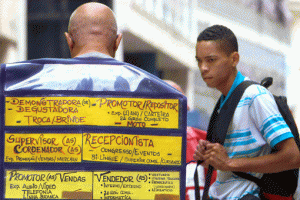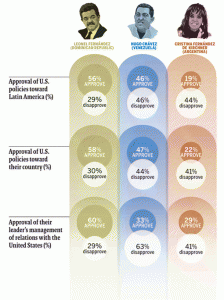
Strength in Numbers
The expansion of free-trade agreements has created a global market of goods and services that has led to better resource distribution. Capital markets seem to be following suit, but in emerging economies the lack of depth remains a challenge. The limited number of securities, the lack of liquidity and the slow emergence of derivatives markets … Read more
Middle Classes, Education and Mobility
The latin American middle class is critical to regional economic development and political stability. A large middle class is thought to bring lower inequality, a more stable investment climate, greater savings and human capital accumulation, and to generate the entrepreneurs who create jobs and foster productivity. As a result, countries with … Read more
Ask the Experts: Market Access and Free Trade
Ron Kirk Answers: Trade liberalization has moved hundreds of millions of people out of poverty and into the global middle class. If countries make serious commitments to open up their markets and play by the rules, trade will continue to support more jobs for working families in the United States and around the world. Even … Read more

Breaking the Cycle
Latin America has the sad distinction of being one of the world’s most violent regions, with crime rates double the world average. Actively struggling to provide safety to their citizens, Latin American governments are pouring millions of dollars into law enforcement, and in some places even deploying the army. Many countries are also working to … Read more

Taking Youth to Market
Vanessa Muñoz, 24, and Hector Quiroga, 22, haven’t met, but they have a lot in common. Both are from poor families; both have children; both live in the same district of Bogotá; and neither has completed secondary education. They are also both members of a 95-million-strong generation of Latin Americans aged 15 to 24 that … Read more
Wake Up, Washington!
In December 3, 2009, President Barack Obama hosted a special White House summit on jobs. With the United States deep in the throes of the most severe economic downturn since the 1930s, and with unemployment hovering around 10 percent, the administration was determined to show an anxious public its commitment to finding ways to get … Read more

Brazil: What’s Next?
To virtually no one’s surprise, Dilma Rousseff took office on January 1, 2011, as Brazil’s first female president. She won decisively—by a 12 percent margin nationwide in the second round—through capturing the many voters at the bottom of the income scale who look forward to continuing gains in their daily lives under her presidency. Dilma’s … Read more
[i]La Argentina que merecemos[/i] by Roberto Lavagna
Roberto Lavagna, Argentina’s economy and production minister from 2002–2005, steered his country through one of the most tumultuous periods in Argentina’s recent economic history. Taking office in the depth of the economic recession, his restructuring of the financial system helped create the conditions for recovery while also making foes along the way. In La Argentina … Read more
[i]The Death and Life of the Great American School System: How Testing and Choice Are Undermining Education[/i] by Diane Ravitch
A broad consensus on education policy has emerged over the past decade, with liberals and conservatives alike championing accountability and choice in America’s public schools. Diane Ravitch, an education scholar who pushed for market-based reforms during her tenure in the U.S. federal government (George H.W. Bush and Clinton administrations), recently defected from this movement. Her … Read more
[i]Cuba libre: Vivir y escribir en La Habana[/i] by Yoani Sánchez
The realities of the “revolution” in Cuba and the mysteries of life in Havana have long eluded understanding by those outside the island. But since 2007, Yoani Sánchez has sought to shed light on the present-day reality of Cuban life through her Generation Y blog. Now the world-renowned blogger, named by CNN and Time magazine … Read more
Ask the Experts: Education
Joel Klein Answers: In an increasingly competitive global economy, the only way America’s kids will be able to succeed is if the culture of public education is focused on performance and accountability. To prepare students for a workforce in which college is fast becoming a necessity, we need to start with great teachers. Excellence in … Read more

[i]AQ[/i] Poll
Maybe Washington policy looks worse the farther you are from the U.S. That would be one conclusion from the results of surveys by Greenberg Quinlan Rosner. The surveys were conducted in Venezuela (June 24 to July 6, 2010), the Dominican Republic (April 29 to May 5) and Argentina (May 26 to June 17). Two results … Read more
From the Think Tanks
Plomo o plata, a phrase well-known to Mexican journalists, simply means: we own you. Accept a drug cartel’s plata (slang for money) and publish what they tell you, or get shot, plomo (lead). The horrifying spike in drug violence in Mexico over the last four years has taken a heavy toll on the lives and … Read more

10 Things to Do: La Paz
La Paz…At an elevation of just over 12,000 feet (3,660 meters), La Paz is the highest national capital in the world. The city, Bolivia’s second largest, opens up like a fish bowl in the surrounding mountains as you approace by car—making a thrilling impression on visitors. 1. Cheer on the Cholitas. Don’t miss Cholita Wrestling. … Read more
Judicial Malfeasance and the Power of Movies
Layda Negrete and Roberto Hernández insist they are “lawyers with cameras,” not filmmakers. But the two doctoral candidates at University of California-Berkeley have produced one of this year’s most celebrated documentaries. Presunto Culpable (Presumed Guilty) tells the story of Mexico City native José Antonio “Toño” Zuñiga, who was arrested and charged in 2005 for a … Read more


